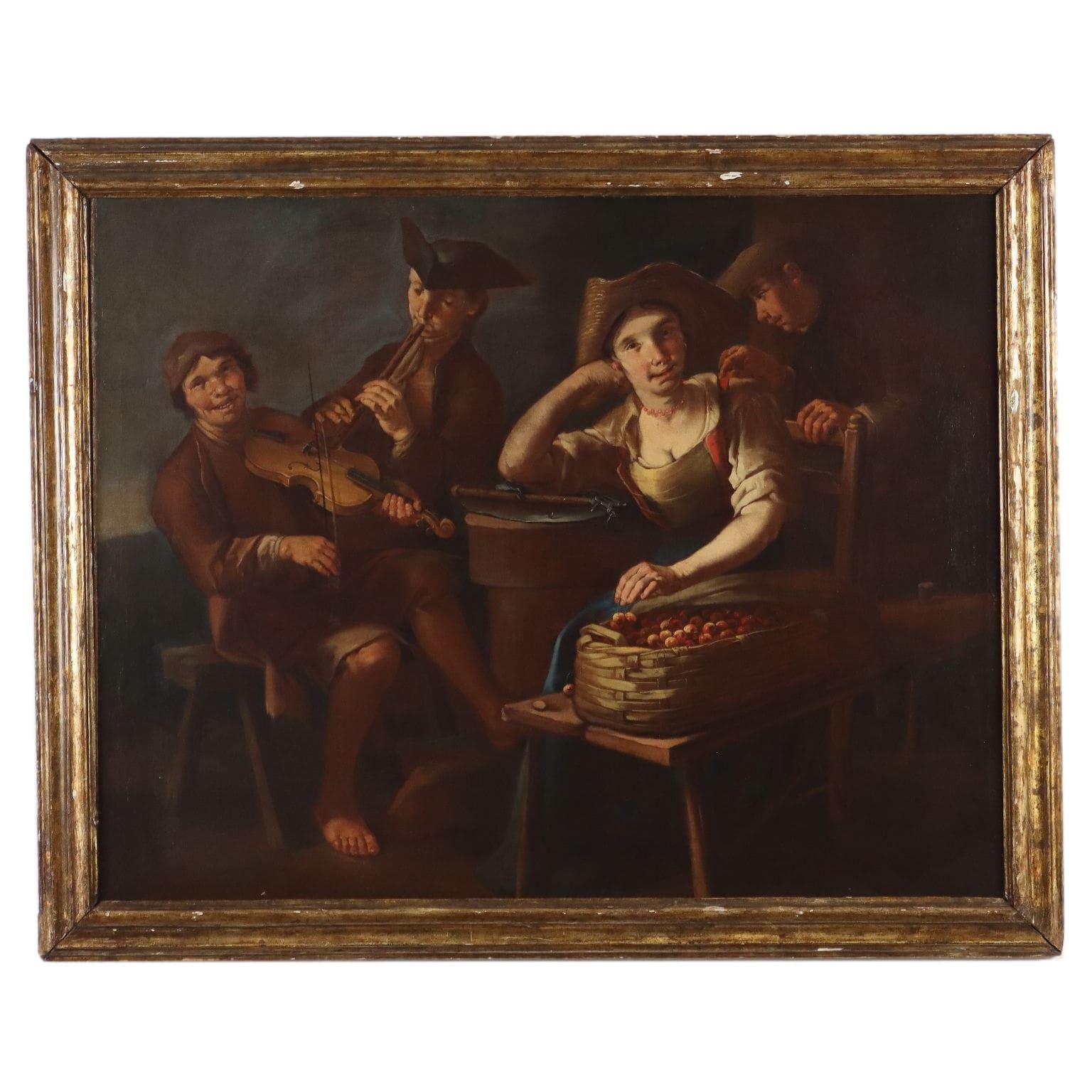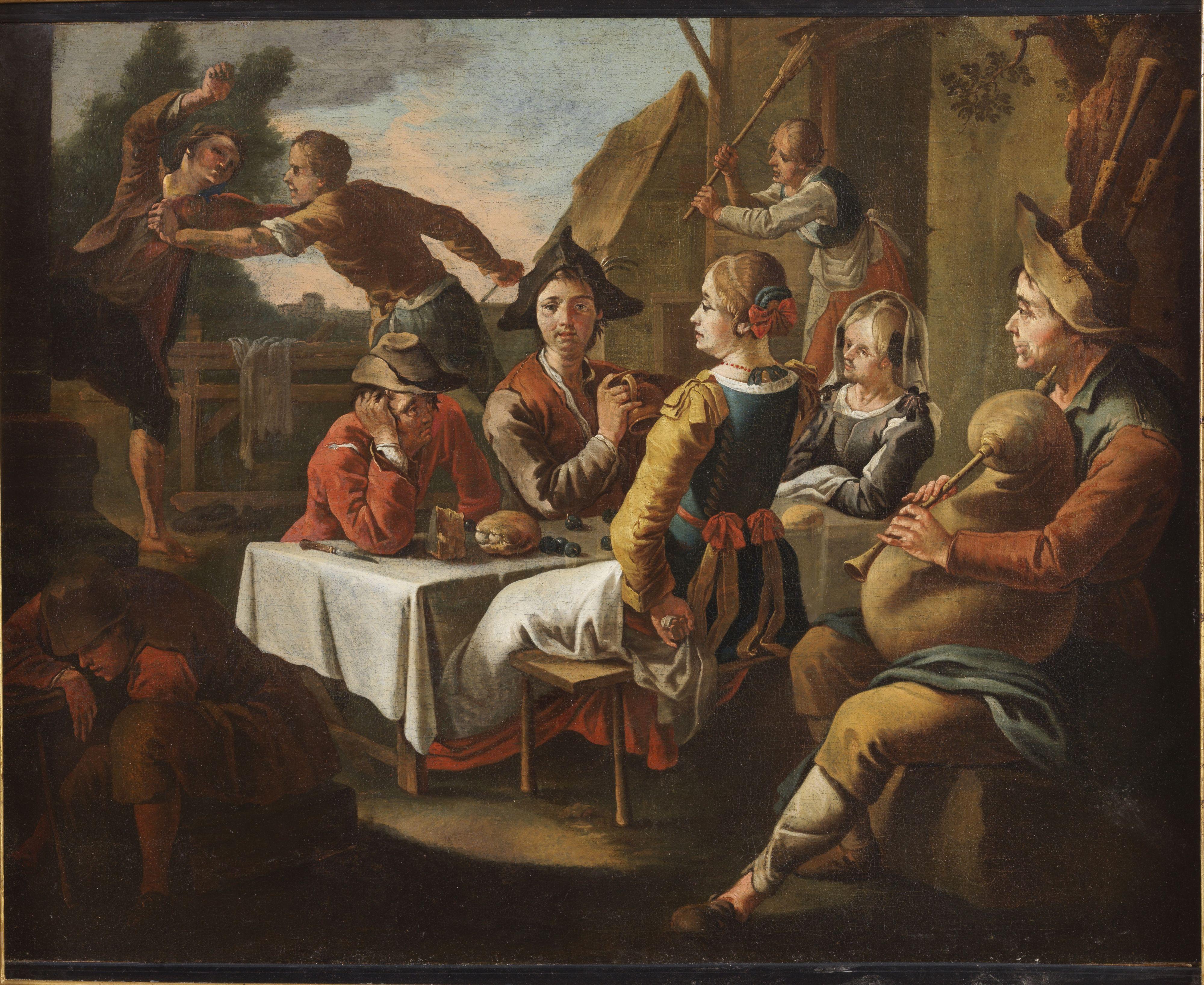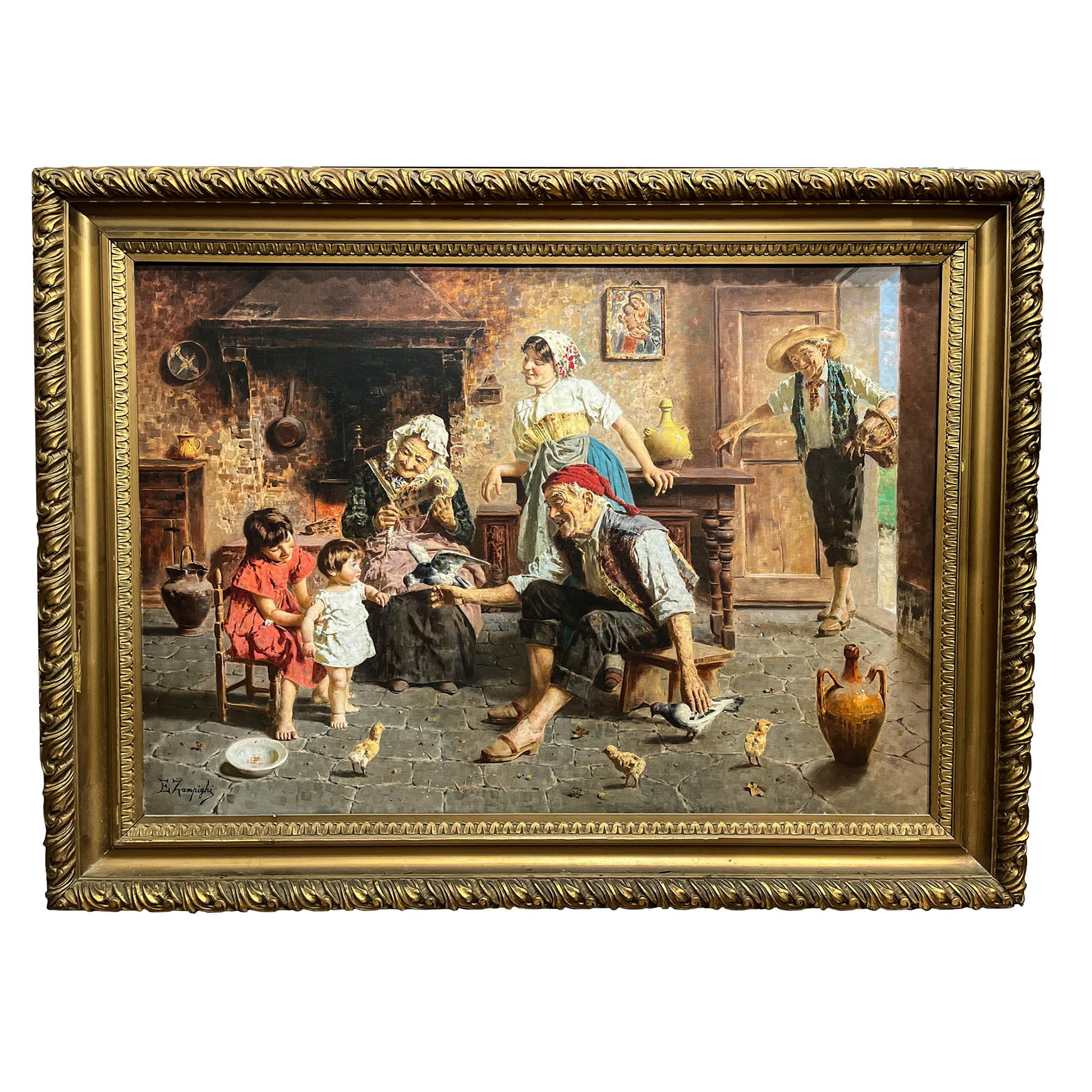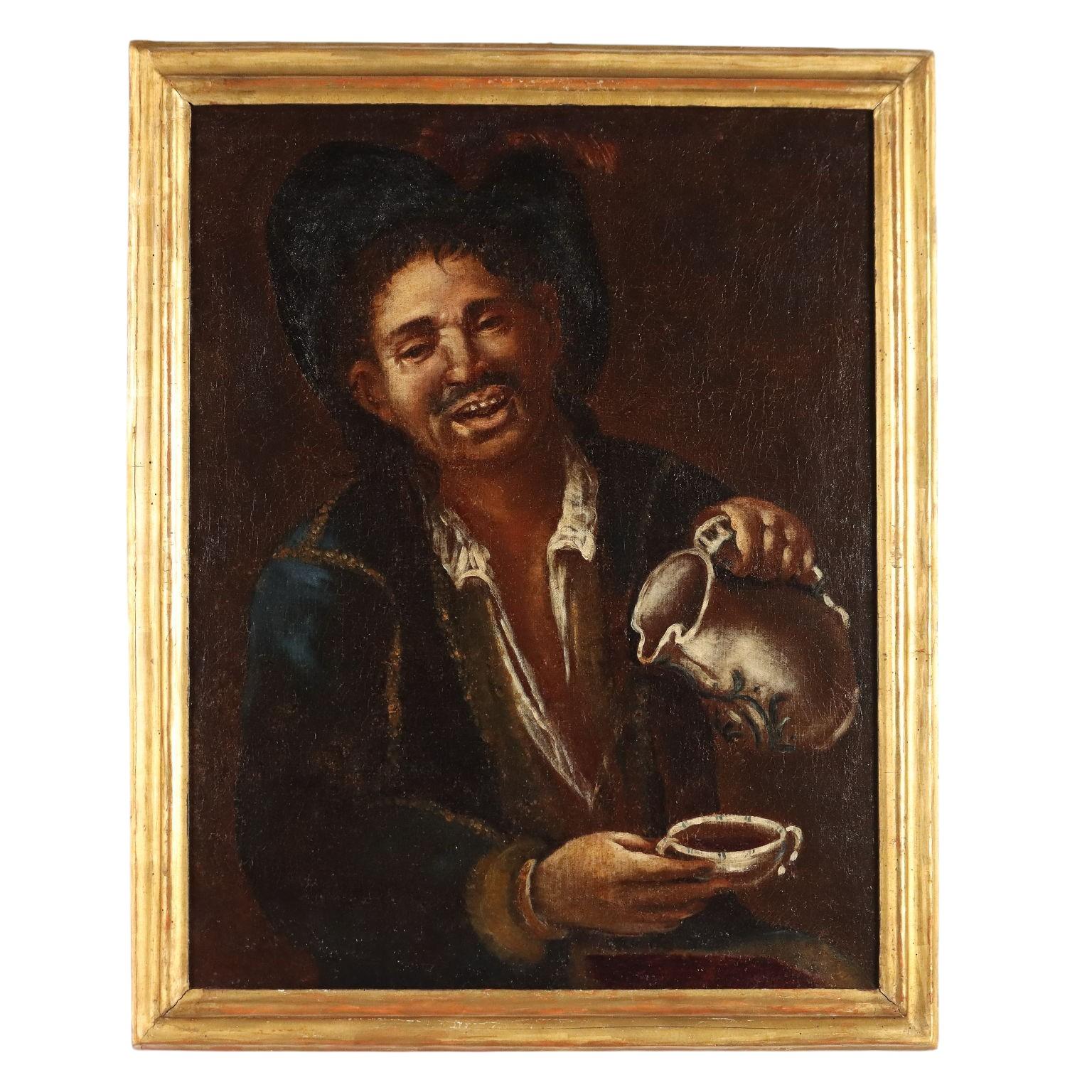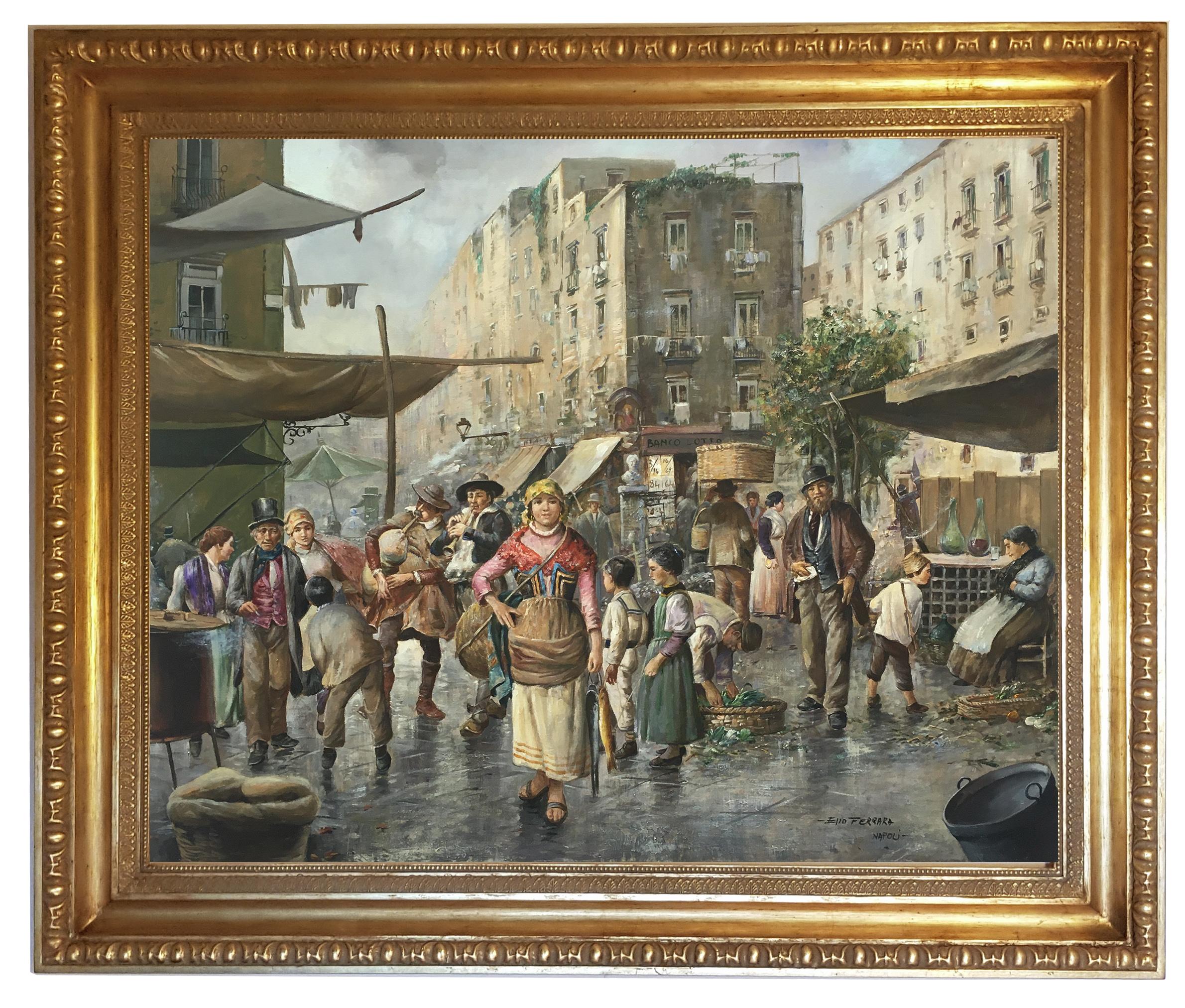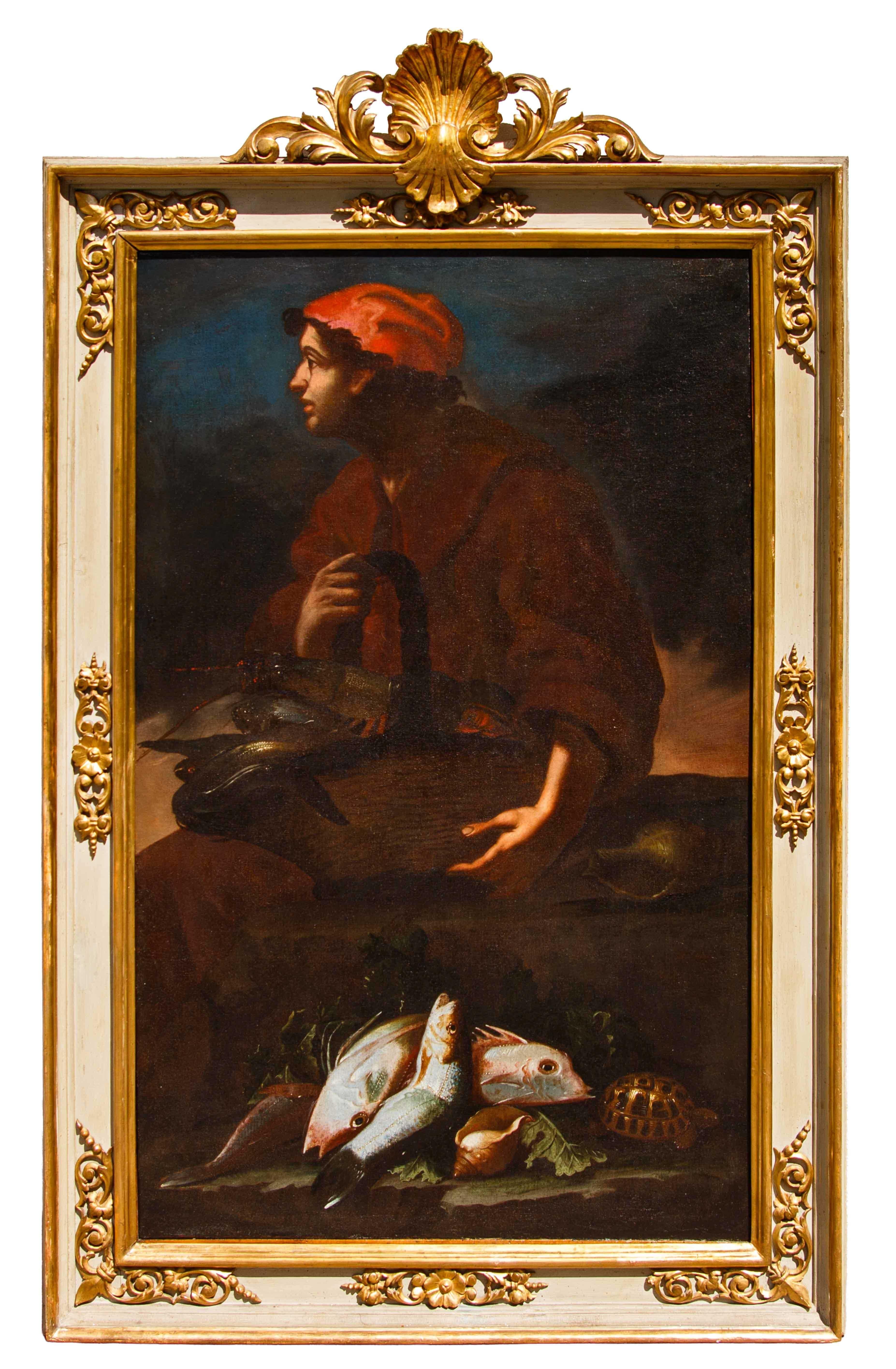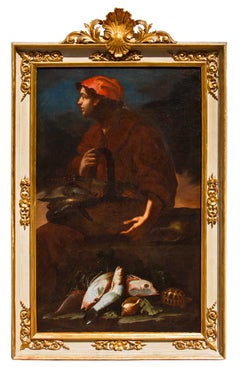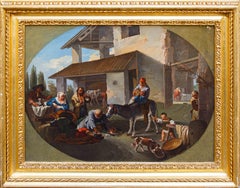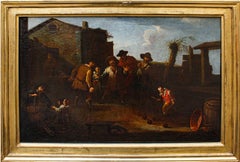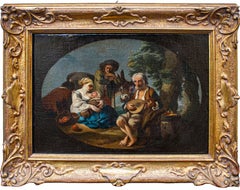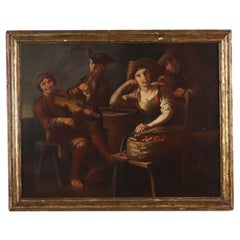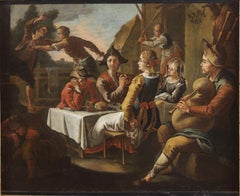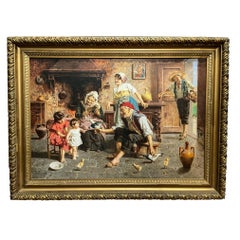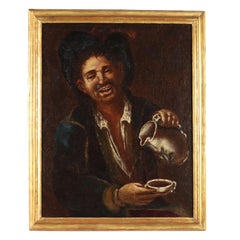Items Similar to The Fishmonger Painted by Giacomo Francesco Cipper known as the Todeschini
Want more images or videos?
Request additional images or videos from the seller
1 of 24
Giacomo Francesco Cipper (Todeschini)The Fishmonger Painted by Giacomo Francesco Cipper known as the Todeschini
$21,765.36
£16,095.07
€18,200
CA$30,119.99
A$33,521.09
CHF 17,451.88
MX$404,803
NOK 218,862.64
SEK 206,729.54
DKK 138,623.56
About the Item
Giacomo Francesco Cipper, called the Todeschini (Feldkirch, 1664 - Milan, 1736)
The fishmonger
Oil on canvas, 64 x 83 cm - Framed, 85 x 101 cm
The crisp harbor air that saturates the present scene renders every small detail with vibrant rendering, even the still moist scales of the fish on display. A family of fishmongers is portrayed as they attend to their daily tasks. If the little son is distracted and the wife is patiently peeling frogs (in one bag it is the initial product, in another, curiously, the outcome of the skinning) the head of the household is slicing a large fish for a customer with tricorn neatly socked on his head. The look of understanding between the two, as well as the gestures employed and the extraordinary veins painted on the vendor's forearm, accentuate the almost Vergian verism gushing from the whole scene: note the vivid cheeks of the depicted and the hanger of hooks to display the hanging wares, neatly arranged at the corner of the table.
The utter lack of pietism with which the excellent artist, Giacomo Francesco Cipper known as the Todeschini (1664-1736) treats his effigies, again demonstrates his artistic goal: to render with lucid pragmatism the beauty of concrete life. Unlike many of his contemporaries who turned scenes of common life to melancholy patheticism, Todeschini faithfully clung to a lively optimistic restitution of life, illuminating in his paintings with peasants, card players and musicians. The artist set out to renew the seventeenth-century tradition of the bamboccianti and to reread the examples of Monsù Bernardo and Alessandro Magnasco in a personal key, with the ambition of transposing the ideas of the latter on a 'monumental' spirit, devoting himself at the same time to a realistic definition of objects of daily use, food and furnishings, reaching the utmost consequences of the comic and grotesque tradition. An Austrian by birth but a Lombard by adoption, Todeschini in 1696 turns out to be already residing in Milan, an essential artistic hub for later reaching the cities of Bergamo and Brescia, at which he was active. Cipper was able to profoundly renew the coeval seventeenth-century tradition of the Bamboccianti, revolutionizing it through a personal figurativism characterized by color plasticism and forthright expressiveness. He began to portray the variegated humanity of the popolo minuto with natural inclination: these representations, however, are not immune to a good dose of irony, satirical verve and, at times, blatant licentiousness, as important as the reforms affecting dialect theater, especially Milanese, which seems to accompany the evolution that intervenes, between Todeschini and Ceruti.
The vibrant brushstrokes veiled in realism and patheticism are found in other works by Todeschini now in private collections, such as the Scena di mercato (Zeri collection), where the figures, baskets, and still lifes of vegetables recall the stylistic features of the scene under consideration; again, a market scene in a private collection; finally, the physiognomy of the boy with his hand holding his head is also discernible in a painting depicting this time a figure of a young man, also in a private collection. See most recently the Gender Scene preserved at the Ala Ponzone Museum in Cremona.
- Creator:Giacomo Francesco Cipper (Todeschini) (1664 - 1736, Italian)
- Dimensions:Height: 33.47 in (85 cm)Width: 39.77 in (101 cm)
- Medium:
- Period:Late 17th Century
- Condition:
- Gallery Location:Milan, IT
- Reference Number:1stDibs: LU2639213034952
About the Seller
No Reviews Yet
Vetted Professional Seller
Every seller passes strict standards for authenticity and reliability
1stDibs seller since 2023
Typical response time: <1 hour
- ShippingRetrieving quote...Shipping from: Milan, Italy
- Return Policy
Authenticity Guarantee
In the unlikely event there’s an issue with an item’s authenticity, contact us within 1 year for a full refund. DetailsMoney-Back Guarantee
If your item is not as described, is damaged in transit, or does not arrive, contact us within 7 days for a full refund. Details24-Hour Cancellation
You have a 24-hour grace period in which to reconsider your purchase, with no questions asked.Vetted Professional Sellers
Our world-class sellers must adhere to strict standards for service and quality, maintaining the integrity of our listings.Price-Match Guarantee
If you find that a seller listed the same item for a lower price elsewhere, we’ll match it.Trusted Global Delivery
Our best-in-class carrier network provides specialized shipping options worldwide, including custom delivery.More From This Seller
View AllAlessandro de' Pesci (active until 1750), Fish seller
Located in Milan, IT
Alessandro de' Pesci (active until 1750)
Fish seller
Oil on canvas, 137 x 84 cm
Critical Record Prof. Alberto Crispo
Still life with a fish theme can be chronologically framed be...
Category
18th Century and Earlier Other Art Style Figurative Paintings
Materials
Canvas, Oil
Paolo Monaldi (Rome, c. 1704 - post 1779), Genre Scene
Located in Milan, IT
Paolo Monaldi (Rome, c. 1704 - post 1779)
Genre scene
Oil on canvas, 50 x 63 cm
Framed, 65 x 80 cm
In the lively artistic scene of 18th-century Rome, dominated by big names and ...
Category
18th Century and Earlier Other Art Style Figurative Paintings
Materials
Canvas, Oil
Game of bowls Oil painting on canvas by Domenico Olivero
Located in Milan, IT
Domenico Olivero (Turin, August 1, 1679 - January 13, 1755)
Game of bowls
Oil on canvas, 43 x 65 cm
With frame, 54.5 x 76
Expert opinion Prof. Alberto Crispo
The painting shown here depicts peasants playing bowls near a farmhouse, while one of them offers sweets to a little girl. The canvas, in my opinion, can be traced back to the hand of Pietro Domenico Olivero (Turin, August 1, 1679 - January 13, 1755), as revealed by comparisons with other works by the artist, such as the Peasants' Feast already at the Gilberto Zabert Gallery in Turin, where we find an entirely similar layout, with the figures crowded around the building, placed on the left, and some household goods piled up on the right, including a copper cauldron almost identical to the one sketched in our painting. But see also other similar subjects painted by the Turin-based artist, such as the Game of Bowls already at the Cantore Gallery in Modena or the other version on the Genoese market in 2019, which, although radically different compositionally, confirm the painter's interest in playful themes and manifest the same ways in delineating characters, with synthetic and robust brushstrokes. The artist was born in Turin, in the parish of St. Thomas, on August 1, 1679 to Giovanna and Francesco, a carver by profession. He trained at the workshop of the painter and architect Melchiorre Baldassarre Bianco. He was esteemed by Victor Amadeus II of Savoy, who commissioned paintings for the Venaria Reale (1714), the Royal Palace of Turin (1716), and Rivoli Castle (1724), as well as by his ministers Pietro Mellarède and Carlo Vincenzo Ferrero di Roasio marquis of Ormea whose collections counted many of the painter's works. His success on the Turin art scene earned him election as prior of the Accademia di San Luca in Turin (1726). In 1731 he painted the eleven canvases with Stories of Franciscan Saints in the sacristy of the church of St. Thomas in Turin, while in 1734 he made the Marriage at Cana for the sanctuary of Oropa. The Savoy commissions continued with the ten canvases executed for the castle of Agliè (1737), the decoration of the third room of the New Archives in the Royal Palace of Turin (1739-41), and the thirty or so works for the hunting lodge at Stupinigi (1748-51). The painter also measured himself in designing sets for the Teatro Regio in Turin (1745-46). He made his will on November 15, 1754, and died in his hometown on January 13, 1755. Olivero's genre scenes, such as the one commented on here, reveal a focus on Flemish painting, particularly by David Teniers the Younger, Peter Mauritz Bolckman, Theodor Helmbreker, and Cornelis de Wael, as well as Roman bamboozlers such as Pieter van Laer, Michelangelo Cerquozzi, and Jan Miel...
Category
18th Century Figurative Paintings
Materials
Canvas, Paint, Oil
Paolo Monaldi (Rome, 1710 - after 1779), attr. , Genre scene
Located in Milan, IT
Paolo Monaldi (Rome, 1710 - after 1779), attr.
Genre scene
Oil on canvas, 28 x 38 cm
Framed, 36.5 x 46 cm
The canvas depicts a moment of repose drawn from the rural world: the...
Category
18th Century and Earlier Other Art Style Figurative Paintings
Materials
Canvas, Oil
The Expulsion of Hagar painted by Ciro Ferri
Located in Milan, IT
Cyrus Ferri (Rome, 1634 - 1689)
The Expulsion of Hagar
Oil on canvas, 69 x 58.5 cm
Framed, 81 x 70 cm
The subject of the work belongs to the Old Testament stories: Hagar was the ...
Category
17th Century Figurative Paintings
Materials
Canvas, Oil
by Riccardo Pellegrini, Eastern Market
By Riccardo Pellegrini
Located in Milan, IT
Riccardo Pellegrini (Milan, 1863 - Crescenzago, 1934)
Eastern Market
Oil on panel, 31.5 x 44.5 cm
Framed, 51 x 61 cm
Signed lower right
Riccardo Pellegrini, born in Milan in 186...
Category
19th Century Other Art Style Landscape Paintings
Materials
Canvas, Oil
You May Also Like
Wooed Cherry Seller and two Ringers ca. 1720.
By Giacomo Francesco Cipper (Todeschini)
Located in Milan, IT
Oil on Canvas.
The painting comes with expertise by art historian Dr. Giuseppe Sava.
Protagonist of the scene of open-air market is a cherry seller, who wears a flashy straw hat and...
Category
18th Century Other Art Style Figurative Paintings
Materials
Oil
18th Century Exterior Inn Cipper Todeschini Scene People Oil on Canvas Yellow
By Giacomo Francesco Cipper (Todeschini)
Located in Sanremo, IT
Painting Oil on canvas measuring 72 x 92 cm and 98 x 114 cm with a wonderful contemporary frame depicting an outdoor inn scene by the painter Giacomo Francesco Cipper known as Todesc...
Category
1710s Italian School Figurative Paintings
Materials
Canvas, Oil
Painting "Ammirando i Piccioni" by Eugenio Zampighi
By Eugenio Zampighi
Located in New York, NY
Zampighi's "Ammirando i Piccioni" Admiring the Little Ones
Signed lower left
Artist: Eugenio Zampighi (Italian, 1859-1944)
Medium: oil on linen
Dimensions: 29 1/2 in. x 41 1/2 in framed
"National Association of Artists, Piazza Pitti, Florence, Italy" labels on stretcher and reverse of frame,
Born in Modena, Italy, Eugenio Zampighi entered the local Academy of Design at 13. He eventually became one of the most decorated students, and in 1869, he was awarded a scholarship and spent the next three years in Rome. By 1884, having settled in Florence, he had begun to paint the genre works that eventually placed him with the leading artist’s of Italy.
Zampighi proceeded to devote his career to painting simple Italian domestic life, centring on the figures he saw around him and usually depicted in jovial company, similar to the Spanish court...
Category
19th Century Figurative Paintings
Materials
Linen, Oil
The Drinker, Painting by Follower of James Francis Cipper, 18th century
Located in Milan, IT
Oil on Canvas.
The painting refers in pictorial manner and subject matter to the production of Giacomo Francesco Cipper known as the Todeschini, an artist of Austrian origin but esta...
Category
18th Century Other Art Style Portrait Paintings
Materials
Oil
LA VIGILIA DI NATALE - Elio Ferrara Italian figurative oil on canvas painting
By Elio Ferrara
Located in Napoli, IT
La Vigilia di Natale - Oil on canvas Elio Ferrara, Italy, 1980s
Elio Ferrara was born in Naples, Italy on October 19, 1945. He studied at the Artistic Lyceum and also the Academy of Fine Arts in Naples. Both his father and his grandfather were painters, so from a very young age, he was exposed to the artistic and cultural life of his city. He also accompanied his father on several of his study trips throughout Europe. In 1962, he became actively involved in the painting of stage scenery...
Category
1980s Italian School Figurative Paintings
Materials
Canvas, Oil
COUNTRY SCENE - Italian School - Italy - Oil on canvas painting
By Pietro Colonna
Located in Napoli, IT
Country scene - Pietro Colonna Italia 2012 - Oil on canvas cm. 30x24
The painter Pietro Colonna depicts in this picture a cheerful and colorful peasant folk dance. The painting is in...
Category
Early 2000s Italian School Figurative Paintings
Materials
Canvas, Oil
More Ways To Browse
Di Mano In Mano
Antique Piccolo
Grosso Giacomo
Painting Musical Instruments
Woman Floating
Bavarian Art
Dutch Oil Painting Interior
Cardinal Painting
Gary John Street Art
Queen Elizabeth Painting
19th Century Oil Painting Girl
Kitchen Scene Painting
Medici Painting
Saint Joseph Painting
Oversized Oil Painting
Donkey Painting
Kiss Oil Painting
Raphael Oil
